How AI-Driven Product Research Surveys Helps Map Your ROI Journey
How AI-Driven Product Research Surveys Helps Map Your ROI Journey
How AI-Driven Product Research Surveys Helps Map Your ROI Journey



In today's competitive landscape, understanding and optimizing your Return on Investment (ROI) is crucial for business success. For companies navigating the complex terrain of product development and market positioning, leveraging AI-driven product research surveys is a gamechanger. These advanced tools not only streamline data collection and analysis but also provide actionable insights that directly impact ROI. Let's delve into how AI-driven surveys bridge the gap between tactical efforts and measurable outcomes, shaping a clear path to ROI optimization.
Product research surveys are systematic methods used by businesses to gather insights and feedback from consumers or target audiences regarding their products or services. These surveys are designed to gather specific information that helps in understanding consumer preferences, needs, expectations, and opinions about existing or potential products. The primary goal of product research surveys is to inform decision-making throughout the product lifecycle, from initial concept development to post-launch evaluation.
Key aspects of product research surveys include
1. Objective Setting: Clearly defining the goals and objectives of the survey, such as understanding market demand, identifying product features that resonate with consumers, or gauging customer satisfaction.
2. Survey Design: Crafting survey questions and formats that elicit relevant and actionable responses. This includes choosing between open-ended and closed-ended questions, as well as incorporating rating scales or multiple-choice options.
3. Target Audience: Identifying and reaching out to the appropriate demographic or customer segments that align with the product's target market.
4. Data Collection: Administering the survey through various channels such as online platforms, email campaigns, in-person interviews, or mobile apps to collect responses from participants.
5. Data Analysis: Analyzing survey responses to uncover insights and trends. This may involve quantitative analysis for statistical trends or qualitative analysis to understand underlying motivations and sentiments.
6. Insight Generation: Using the findings to generate actionable insights that inform product development strategies, marketing campaigns, pricing decisions, and overall business strategies.
Product research surveys play a crucial role in validating product concepts, refining features based on user feedback, identifying competitive advantages, and ensuring alignment with consumer expectations. They help businesses mitigate risks associated with product launches and enhance the likelihood of success in competitive markets.
Enhanced Data Collection and Analysis
At the heart of AI-driven product research surveys lies their ability to revolutionize data collection and analysis. Traditional methods often struggle with the volume and complexity of consumer feedback. AI, however, excels in automating responses and processing vast datasets in real-time. This capability allows businesses to gather insights from a larger audience base, ensuring comprehensive market feedback that informs strategic decisions.
By deploying AI algorithms to analyze survey responses, businesses uncover valuable patterns and correlations. These insights extend beyond surfacelevel feedback, providing deep understanding into consumer preferences, pain points, and emerging trends. For example, a retail company launching a new line of smart home devices use AI to analyze customer feedback gathered through surveys. Insights reveal specific features that resonate most with consumers, guiding product refinement and market positioning strategies for maximum ROI.
Predictive Analytics for Market Trends
AI-driven surveys empower businesses with predictive analytics capabilities, enabling them to forecast market trends and consumer behavior. By analyzing historical data and ongoing survey responses, AI algorithms identify emerging patterns that indicate future market shifts. This foresight is invaluable for strategic planning, allowing companies to proactively adapt products and marketing strategies to meet evolving consumer expectations.
For instance, a fashion retailer leveraging AIdriven surveys may notice a growing preference for sustainable materials among survey respondents. Armed with this insight, the retailer pivots its product lineup towards ecofriendly options, capitalizing on a burgeoning market trend. By aligning product offerings with predictive analytics, businesses not only enhance consumer relevance but also position themselves ahead of competitors, driving higher ROI through market leadership.
Personalized Insights and Recommendations
One of the most significant advantages of AI-driven product research surveys is their ability to deliver personalized insights and recommendations. Traditional surveys often provide generic feedback, making it challenging for businesses to tailor strategies to individual consumer preferences effectively. AI changes this paradigm by analyzing survey data at a granular level, generating personalized recommendations based on demographic, behavioral, and psychographic factors.
Imagine a tech startup launching a new mobile app in a competitive market. Through AI-driven surveys embedded within the app, the startup collects real-time feedback on user experience, feature preferences, and performance issues. AI algorithms analyze this data to create personalized insights for different user segments. For power users, the startup might prioritize enhancing advanced features, while for new users, improving onboarding tutorials could be the focus. These tailored recommendations optimize user satisfaction and retention, driving sustained ROI growth.
Faster Iterative Development Cycles
Innovation and agility are paramount in today's fast-paced market environment. AI-driven product research surveys facilitate faster iterative development cycles by providing timely feedback loops. Instead of waiting months for comprehensive market studies, businesses continuously gather and analyze data through AI-powered surveys. This agile approach accelerates decision-making processes, enabling rapid adjustments to product designs, features, and marketing strategies.
For example, a software company developing a new productivity tool integrates AI-driven surveys into its beta testing phase. Early adopters provide feedback on usability and functionality, which AI analyzes in real-time. Identified bugs are swiftly addressed, and user suggestions are incorporated into subsequent updates. This iterative refinement not only enhances product quality but also ensures that the final release meets market expectations effectively, optimizing ROI by minimizing time-to-market delays.
Cost Efficiency and Resource Optimization
Beyond enhancing operational efficiency, AI-driven product research surveys deliver cost savings and resource optimization benefits. Traditional market research methods are resource-intensive, requiring substantial investments in survey administration, data processing, and analysis. AI automation minimizes these costs by streamlining repetitive tasks and maximizing the use of human resources for strategic initiatives.
Consider a consumer goods manufacturer seeking to launch a new line of health supplements. By leveraging AI-driven surveys to gauge consumer interest, preferences, and pricing sensitivity, the manufacturer reduces the need for extensive focus groups and manual data entry. This cost-effective approach reallocates budgetary resources towards product innovation and marketing campaigns, driving higher ROI through optimized resource allocation and streamlined operations.
Use Case: AI-Powered Product Feedback Loop
To illustrate the tangible benefits of AI-driven product research surveys, let's explore a use case scenario:
Use Case: Tech Startup Enhancing Mobile App User Experience
A tech startup is preparing to launch a new mobile app designed for remote project management. To gather initial feedback and refine features before the official release, the startup implements AI-driven surveys within the app interface. Users are prompted to provide feedback on usability, feature preferences, and overall satisfaction through in-app surveys.
AI algorithms analyze the survey responses in real-time, identifying common pain points and feature requests. Based on these insights, the startup prioritizes improvements such as streamlined task management workflows and enhanced collaboration tools. Iterative updates are rolled out frequently, addressing user feedback promptly and ensuring a user-centric app experience.
As a result of integrating AI-driven surveys into their product development process, the tech startup achieves several key outcomes:
Improved User Satisfaction: Enhanced app functionality and user experience lead to higher user satisfaction rates and increased engagement.
Reduced Churn Rates: Addressing user concerns proactively reduces churn rates, improving user retention and long-term profitability.
Accelerated Market Adoption: Positive word-of-mouth generated by satisfied users accelerates market adoption, driving early-stage revenue growth and positioning the app competitively.
In Conclusion
AI-driven product research surveys represent a transformative tool for businesses seeking to optimize their ROI journey. By enhancing data collection and analysis, predicting market trends, delivering personalized insights, facilitating faster iterations, and optimizing resource allocation, AI empowers companies to make informed decisions that drive measurable ROI growth. As businesses continue to embrace AI technologies, the synergy between AI-driven survey builders like Metaforms and strategic decision-making will continue to reshape industries, ensuring sustained competitiveness and profitability in dynamic market landscapes.
In today's competitive landscape, understanding and optimizing your Return on Investment (ROI) is crucial for business success. For companies navigating the complex terrain of product development and market positioning, leveraging AI-driven product research surveys is a gamechanger. These advanced tools not only streamline data collection and analysis but also provide actionable insights that directly impact ROI. Let's delve into how AI-driven surveys bridge the gap between tactical efforts and measurable outcomes, shaping a clear path to ROI optimization.
Product research surveys are systematic methods used by businesses to gather insights and feedback from consumers or target audiences regarding their products or services. These surveys are designed to gather specific information that helps in understanding consumer preferences, needs, expectations, and opinions about existing or potential products. The primary goal of product research surveys is to inform decision-making throughout the product lifecycle, from initial concept development to post-launch evaluation.
Key aspects of product research surveys include
1. Objective Setting: Clearly defining the goals and objectives of the survey, such as understanding market demand, identifying product features that resonate with consumers, or gauging customer satisfaction.
2. Survey Design: Crafting survey questions and formats that elicit relevant and actionable responses. This includes choosing between open-ended and closed-ended questions, as well as incorporating rating scales or multiple-choice options.
3. Target Audience: Identifying and reaching out to the appropriate demographic or customer segments that align with the product's target market.
4. Data Collection: Administering the survey through various channels such as online platforms, email campaigns, in-person interviews, or mobile apps to collect responses from participants.
5. Data Analysis: Analyzing survey responses to uncover insights and trends. This may involve quantitative analysis for statistical trends or qualitative analysis to understand underlying motivations and sentiments.
6. Insight Generation: Using the findings to generate actionable insights that inform product development strategies, marketing campaigns, pricing decisions, and overall business strategies.
Product research surveys play a crucial role in validating product concepts, refining features based on user feedback, identifying competitive advantages, and ensuring alignment with consumer expectations. They help businesses mitigate risks associated with product launches and enhance the likelihood of success in competitive markets.
Enhanced Data Collection and Analysis
At the heart of AI-driven product research surveys lies their ability to revolutionize data collection and analysis. Traditional methods often struggle with the volume and complexity of consumer feedback. AI, however, excels in automating responses and processing vast datasets in real-time. This capability allows businesses to gather insights from a larger audience base, ensuring comprehensive market feedback that informs strategic decisions.
By deploying AI algorithms to analyze survey responses, businesses uncover valuable patterns and correlations. These insights extend beyond surfacelevel feedback, providing deep understanding into consumer preferences, pain points, and emerging trends. For example, a retail company launching a new line of smart home devices use AI to analyze customer feedback gathered through surveys. Insights reveal specific features that resonate most with consumers, guiding product refinement and market positioning strategies for maximum ROI.
Predictive Analytics for Market Trends
AI-driven surveys empower businesses with predictive analytics capabilities, enabling them to forecast market trends and consumer behavior. By analyzing historical data and ongoing survey responses, AI algorithms identify emerging patterns that indicate future market shifts. This foresight is invaluable for strategic planning, allowing companies to proactively adapt products and marketing strategies to meet evolving consumer expectations.
For instance, a fashion retailer leveraging AIdriven surveys may notice a growing preference for sustainable materials among survey respondents. Armed with this insight, the retailer pivots its product lineup towards ecofriendly options, capitalizing on a burgeoning market trend. By aligning product offerings with predictive analytics, businesses not only enhance consumer relevance but also position themselves ahead of competitors, driving higher ROI through market leadership.
Personalized Insights and Recommendations
One of the most significant advantages of AI-driven product research surveys is their ability to deliver personalized insights and recommendations. Traditional surveys often provide generic feedback, making it challenging for businesses to tailor strategies to individual consumer preferences effectively. AI changes this paradigm by analyzing survey data at a granular level, generating personalized recommendations based on demographic, behavioral, and psychographic factors.
Imagine a tech startup launching a new mobile app in a competitive market. Through AI-driven surveys embedded within the app, the startup collects real-time feedback on user experience, feature preferences, and performance issues. AI algorithms analyze this data to create personalized insights for different user segments. For power users, the startup might prioritize enhancing advanced features, while for new users, improving onboarding tutorials could be the focus. These tailored recommendations optimize user satisfaction and retention, driving sustained ROI growth.
Faster Iterative Development Cycles
Innovation and agility are paramount in today's fast-paced market environment. AI-driven product research surveys facilitate faster iterative development cycles by providing timely feedback loops. Instead of waiting months for comprehensive market studies, businesses continuously gather and analyze data through AI-powered surveys. This agile approach accelerates decision-making processes, enabling rapid adjustments to product designs, features, and marketing strategies.
For example, a software company developing a new productivity tool integrates AI-driven surveys into its beta testing phase. Early adopters provide feedback on usability and functionality, which AI analyzes in real-time. Identified bugs are swiftly addressed, and user suggestions are incorporated into subsequent updates. This iterative refinement not only enhances product quality but also ensures that the final release meets market expectations effectively, optimizing ROI by minimizing time-to-market delays.
Cost Efficiency and Resource Optimization
Beyond enhancing operational efficiency, AI-driven product research surveys deliver cost savings and resource optimization benefits. Traditional market research methods are resource-intensive, requiring substantial investments in survey administration, data processing, and analysis. AI automation minimizes these costs by streamlining repetitive tasks and maximizing the use of human resources for strategic initiatives.
Consider a consumer goods manufacturer seeking to launch a new line of health supplements. By leveraging AI-driven surveys to gauge consumer interest, preferences, and pricing sensitivity, the manufacturer reduces the need for extensive focus groups and manual data entry. This cost-effective approach reallocates budgetary resources towards product innovation and marketing campaigns, driving higher ROI through optimized resource allocation and streamlined operations.
Use Case: AI-Powered Product Feedback Loop
To illustrate the tangible benefits of AI-driven product research surveys, let's explore a use case scenario:
Use Case: Tech Startup Enhancing Mobile App User Experience
A tech startup is preparing to launch a new mobile app designed for remote project management. To gather initial feedback and refine features before the official release, the startup implements AI-driven surveys within the app interface. Users are prompted to provide feedback on usability, feature preferences, and overall satisfaction through in-app surveys.
AI algorithms analyze the survey responses in real-time, identifying common pain points and feature requests. Based on these insights, the startup prioritizes improvements such as streamlined task management workflows and enhanced collaboration tools. Iterative updates are rolled out frequently, addressing user feedback promptly and ensuring a user-centric app experience.
As a result of integrating AI-driven surveys into their product development process, the tech startup achieves several key outcomes:
Improved User Satisfaction: Enhanced app functionality and user experience lead to higher user satisfaction rates and increased engagement.
Reduced Churn Rates: Addressing user concerns proactively reduces churn rates, improving user retention and long-term profitability.
Accelerated Market Adoption: Positive word-of-mouth generated by satisfied users accelerates market adoption, driving early-stage revenue growth and positioning the app competitively.
In Conclusion
AI-driven product research surveys represent a transformative tool for businesses seeking to optimize their ROI journey. By enhancing data collection and analysis, predicting market trends, delivering personalized insights, facilitating faster iterations, and optimizing resource allocation, AI empowers companies to make informed decisions that drive measurable ROI growth. As businesses continue to embrace AI technologies, the synergy between AI-driven survey builders like Metaforms and strategic decision-making will continue to reshape industries, ensuring sustained competitiveness and profitability in dynamic market landscapes.
In today's competitive landscape, understanding and optimizing your Return on Investment (ROI) is crucial for business success. For companies navigating the complex terrain of product development and market positioning, leveraging AI-driven product research surveys is a gamechanger. These advanced tools not only streamline data collection and analysis but also provide actionable insights that directly impact ROI. Let's delve into how AI-driven surveys bridge the gap between tactical efforts and measurable outcomes, shaping a clear path to ROI optimization.
Product research surveys are systematic methods used by businesses to gather insights and feedback from consumers or target audiences regarding their products or services. These surveys are designed to gather specific information that helps in understanding consumer preferences, needs, expectations, and opinions about existing or potential products. The primary goal of product research surveys is to inform decision-making throughout the product lifecycle, from initial concept development to post-launch evaluation.
Key aspects of product research surveys include
1. Objective Setting: Clearly defining the goals and objectives of the survey, such as understanding market demand, identifying product features that resonate with consumers, or gauging customer satisfaction.
2. Survey Design: Crafting survey questions and formats that elicit relevant and actionable responses. This includes choosing between open-ended and closed-ended questions, as well as incorporating rating scales or multiple-choice options.
3. Target Audience: Identifying and reaching out to the appropriate demographic or customer segments that align with the product's target market.
4. Data Collection: Administering the survey through various channels such as online platforms, email campaigns, in-person interviews, or mobile apps to collect responses from participants.
5. Data Analysis: Analyzing survey responses to uncover insights and trends. This may involve quantitative analysis for statistical trends or qualitative analysis to understand underlying motivations and sentiments.
6. Insight Generation: Using the findings to generate actionable insights that inform product development strategies, marketing campaigns, pricing decisions, and overall business strategies.
Product research surveys play a crucial role in validating product concepts, refining features based on user feedback, identifying competitive advantages, and ensuring alignment with consumer expectations. They help businesses mitigate risks associated with product launches and enhance the likelihood of success in competitive markets.
Enhanced Data Collection and Analysis
At the heart of AI-driven product research surveys lies their ability to revolutionize data collection and analysis. Traditional methods often struggle with the volume and complexity of consumer feedback. AI, however, excels in automating responses and processing vast datasets in real-time. This capability allows businesses to gather insights from a larger audience base, ensuring comprehensive market feedback that informs strategic decisions.
By deploying AI algorithms to analyze survey responses, businesses uncover valuable patterns and correlations. These insights extend beyond surfacelevel feedback, providing deep understanding into consumer preferences, pain points, and emerging trends. For example, a retail company launching a new line of smart home devices use AI to analyze customer feedback gathered through surveys. Insights reveal specific features that resonate most with consumers, guiding product refinement and market positioning strategies for maximum ROI.
Predictive Analytics for Market Trends
AI-driven surveys empower businesses with predictive analytics capabilities, enabling them to forecast market trends and consumer behavior. By analyzing historical data and ongoing survey responses, AI algorithms identify emerging patterns that indicate future market shifts. This foresight is invaluable for strategic planning, allowing companies to proactively adapt products and marketing strategies to meet evolving consumer expectations.
For instance, a fashion retailer leveraging AIdriven surveys may notice a growing preference for sustainable materials among survey respondents. Armed with this insight, the retailer pivots its product lineup towards ecofriendly options, capitalizing on a burgeoning market trend. By aligning product offerings with predictive analytics, businesses not only enhance consumer relevance but also position themselves ahead of competitors, driving higher ROI through market leadership.
Personalized Insights and Recommendations
One of the most significant advantages of AI-driven product research surveys is their ability to deliver personalized insights and recommendations. Traditional surveys often provide generic feedback, making it challenging for businesses to tailor strategies to individual consumer preferences effectively. AI changes this paradigm by analyzing survey data at a granular level, generating personalized recommendations based on demographic, behavioral, and psychographic factors.
Imagine a tech startup launching a new mobile app in a competitive market. Through AI-driven surveys embedded within the app, the startup collects real-time feedback on user experience, feature preferences, and performance issues. AI algorithms analyze this data to create personalized insights for different user segments. For power users, the startup might prioritize enhancing advanced features, while for new users, improving onboarding tutorials could be the focus. These tailored recommendations optimize user satisfaction and retention, driving sustained ROI growth.
Faster Iterative Development Cycles
Innovation and agility are paramount in today's fast-paced market environment. AI-driven product research surveys facilitate faster iterative development cycles by providing timely feedback loops. Instead of waiting months for comprehensive market studies, businesses continuously gather and analyze data through AI-powered surveys. This agile approach accelerates decision-making processes, enabling rapid adjustments to product designs, features, and marketing strategies.
For example, a software company developing a new productivity tool integrates AI-driven surveys into its beta testing phase. Early adopters provide feedback on usability and functionality, which AI analyzes in real-time. Identified bugs are swiftly addressed, and user suggestions are incorporated into subsequent updates. This iterative refinement not only enhances product quality but also ensures that the final release meets market expectations effectively, optimizing ROI by minimizing time-to-market delays.
Cost Efficiency and Resource Optimization
Beyond enhancing operational efficiency, AI-driven product research surveys deliver cost savings and resource optimization benefits. Traditional market research methods are resource-intensive, requiring substantial investments in survey administration, data processing, and analysis. AI automation minimizes these costs by streamlining repetitive tasks and maximizing the use of human resources for strategic initiatives.
Consider a consumer goods manufacturer seeking to launch a new line of health supplements. By leveraging AI-driven surveys to gauge consumer interest, preferences, and pricing sensitivity, the manufacturer reduces the need for extensive focus groups and manual data entry. This cost-effective approach reallocates budgetary resources towards product innovation and marketing campaigns, driving higher ROI through optimized resource allocation and streamlined operations.
Use Case: AI-Powered Product Feedback Loop
To illustrate the tangible benefits of AI-driven product research surveys, let's explore a use case scenario:
Use Case: Tech Startup Enhancing Mobile App User Experience
A tech startup is preparing to launch a new mobile app designed for remote project management. To gather initial feedback and refine features before the official release, the startup implements AI-driven surveys within the app interface. Users are prompted to provide feedback on usability, feature preferences, and overall satisfaction through in-app surveys.
AI algorithms analyze the survey responses in real-time, identifying common pain points and feature requests. Based on these insights, the startup prioritizes improvements such as streamlined task management workflows and enhanced collaboration tools. Iterative updates are rolled out frequently, addressing user feedback promptly and ensuring a user-centric app experience.
As a result of integrating AI-driven surveys into their product development process, the tech startup achieves several key outcomes:
Improved User Satisfaction: Enhanced app functionality and user experience lead to higher user satisfaction rates and increased engagement.
Reduced Churn Rates: Addressing user concerns proactively reduces churn rates, improving user retention and long-term profitability.
Accelerated Market Adoption: Positive word-of-mouth generated by satisfied users accelerates market adoption, driving early-stage revenue growth and positioning the app competitively.
In Conclusion
AI-driven product research surveys represent a transformative tool for businesses seeking to optimize their ROI journey. By enhancing data collection and analysis, predicting market trends, delivering personalized insights, facilitating faster iterations, and optimizing resource allocation, AI empowers companies to make informed decisions that drive measurable ROI growth. As businesses continue to embrace AI technologies, the synergy between AI-driven survey builders like Metaforms and strategic decision-making will continue to reshape industries, ensuring sustained competitiveness and profitability in dynamic market landscapes.
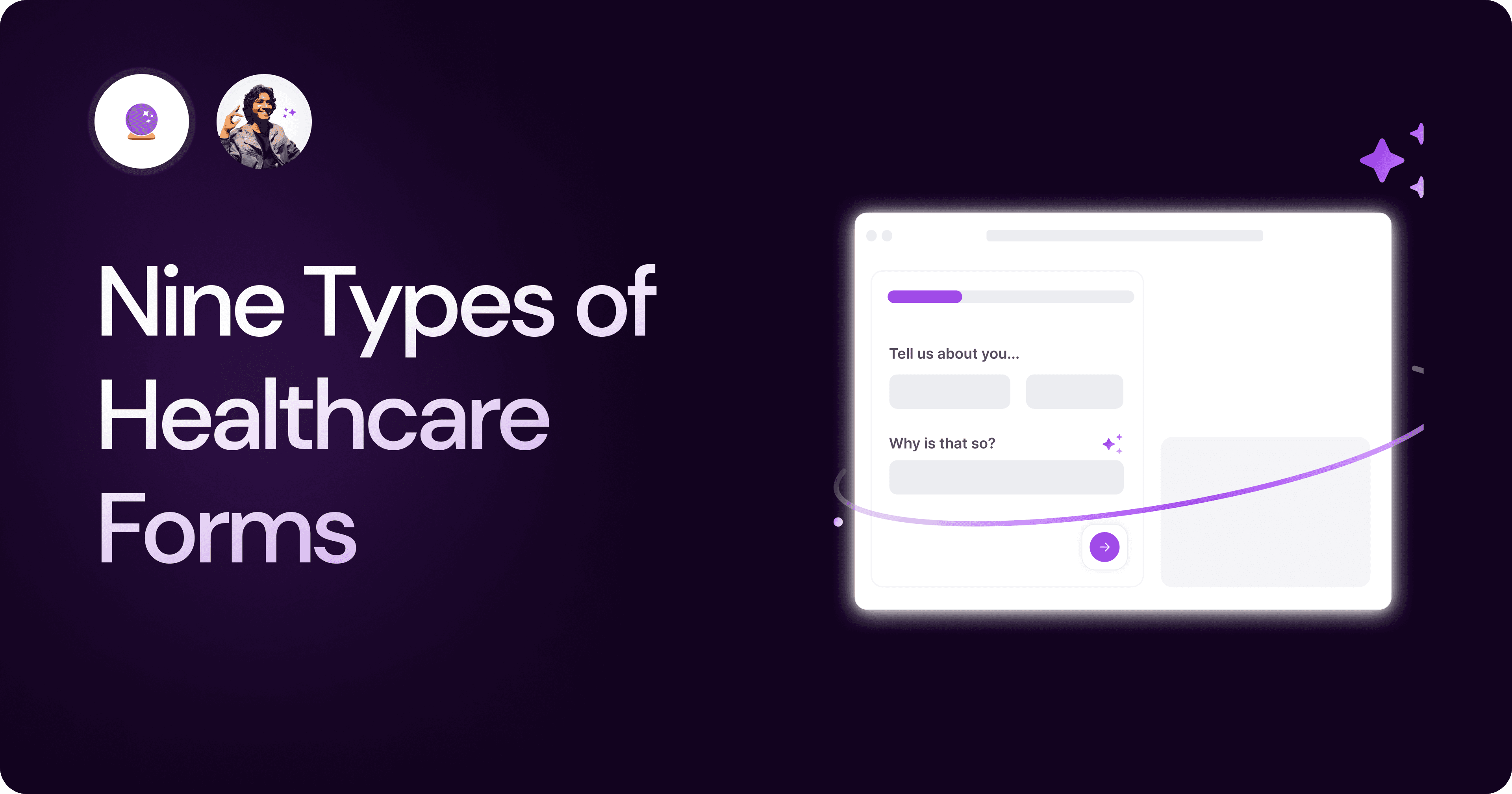
Nine Types of Healthcare and Medical Forms.
Medical forms are a must-have for any healthcare business or practitioner. Learn about the different kinds of medical and healthcare forms.
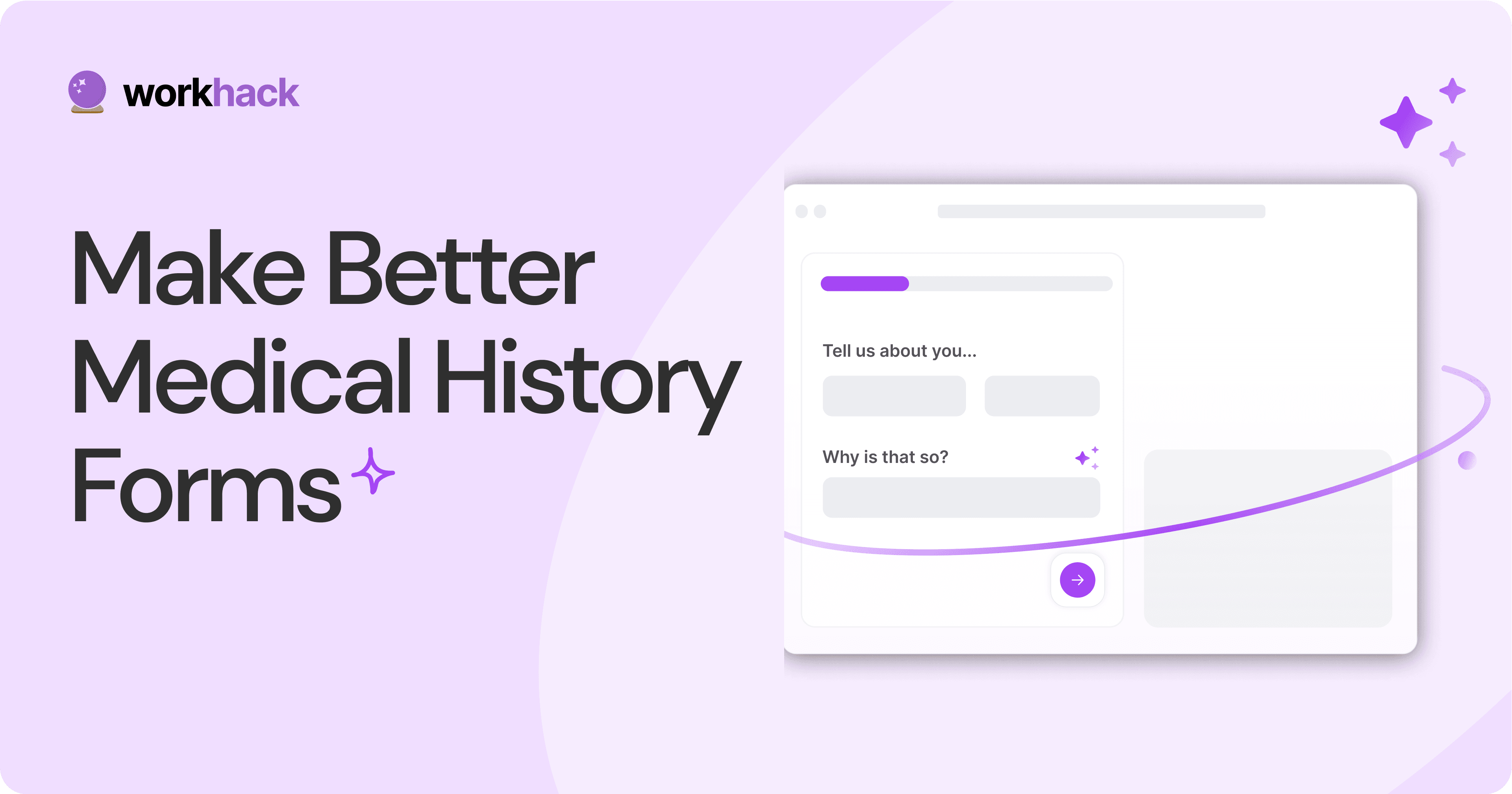
4 Tips for Better Medical History Forms.
Medical history forms are central to patient care, onboarding, and medical administration records. Learn how to make them easier to fill.
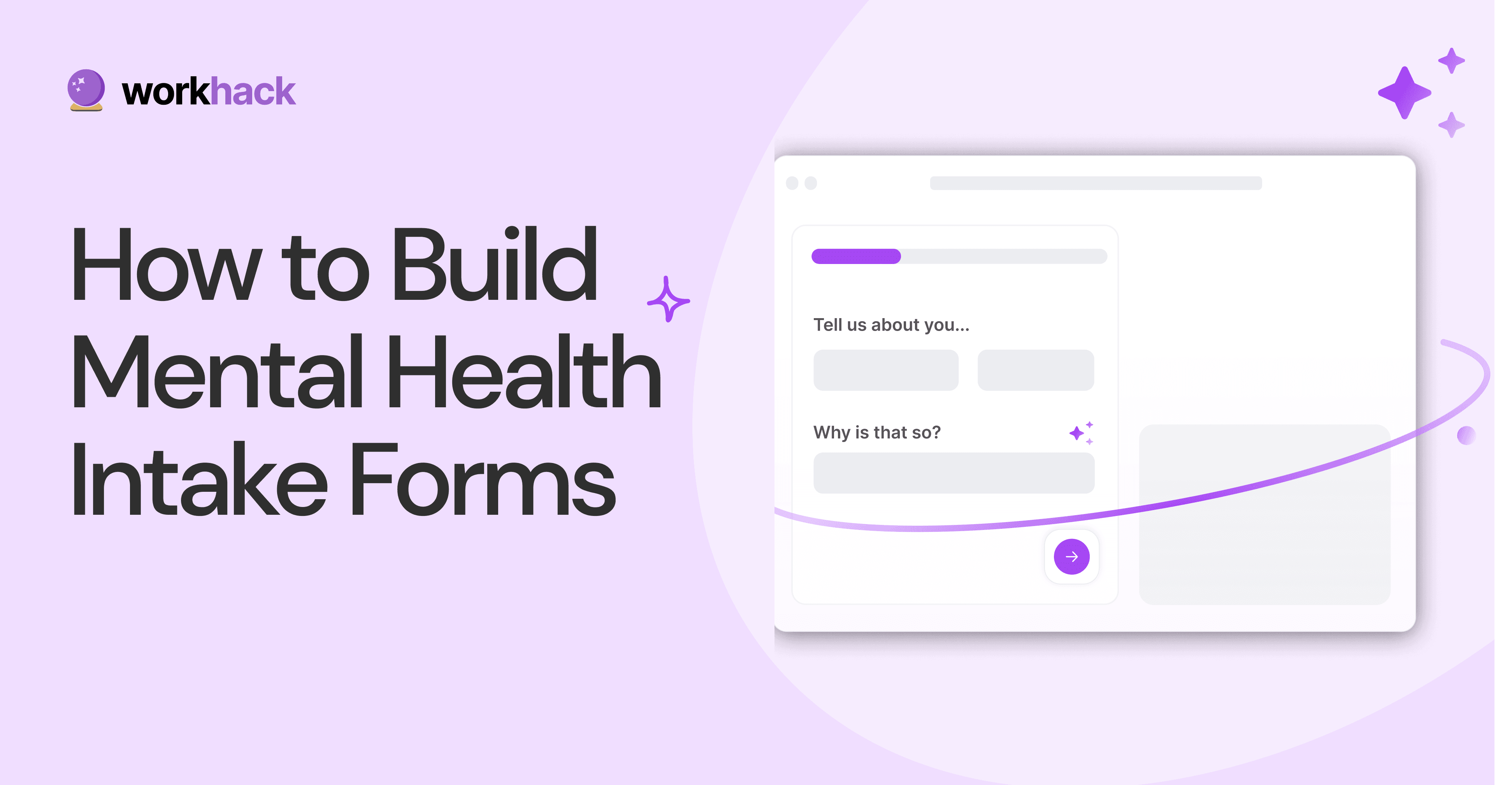
How to Build Mental Health Intake Forms?
Mental health intake forms are not like patient intake forms. Mental health intake forms deal with far more sensitive data and have specific design methods.
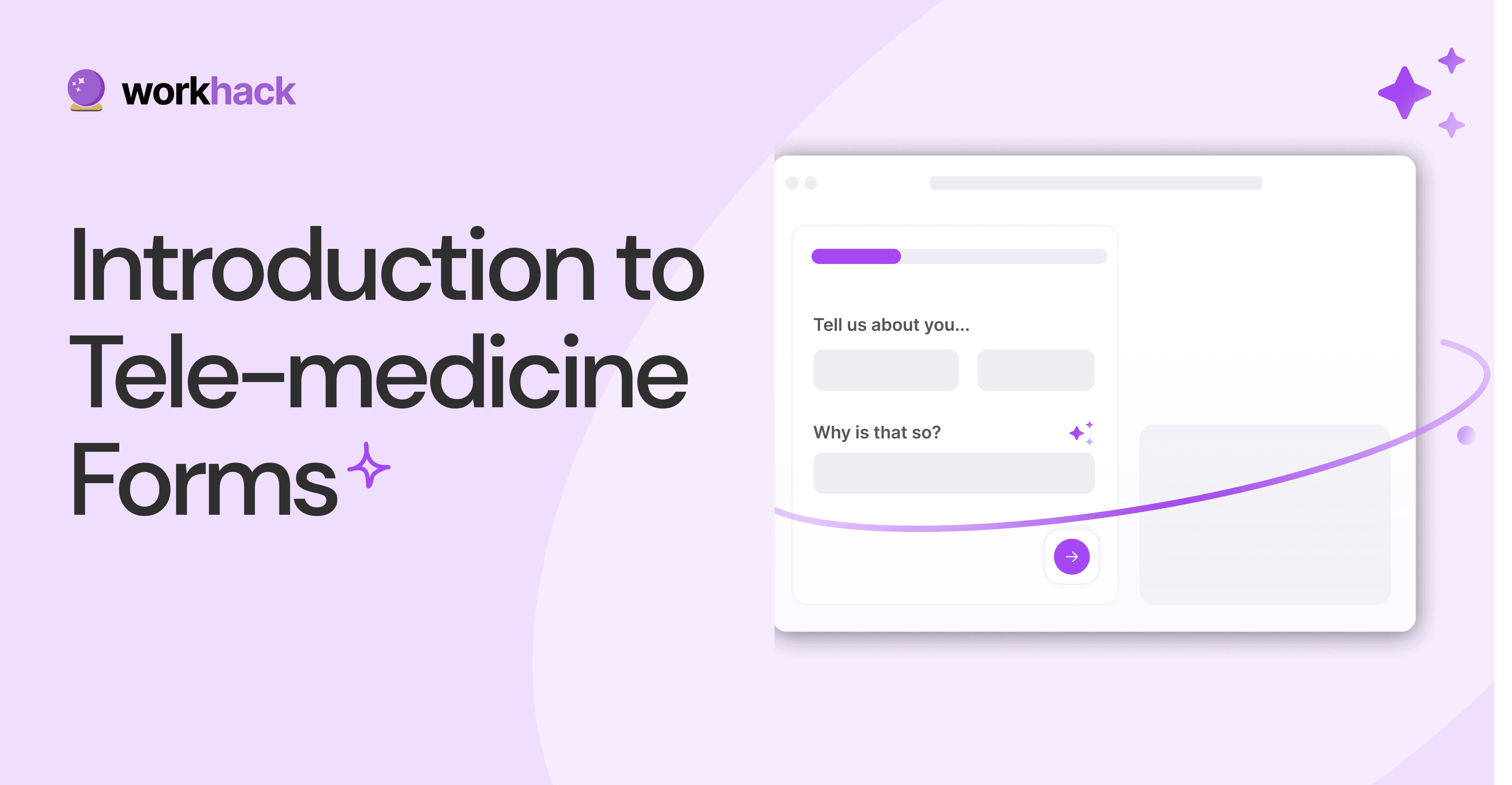
What, Why and How of Telemedicine Forms.
Telemedicine is on the rise and with different form builders out there, which one best suits your needs as a healthcare services provider?
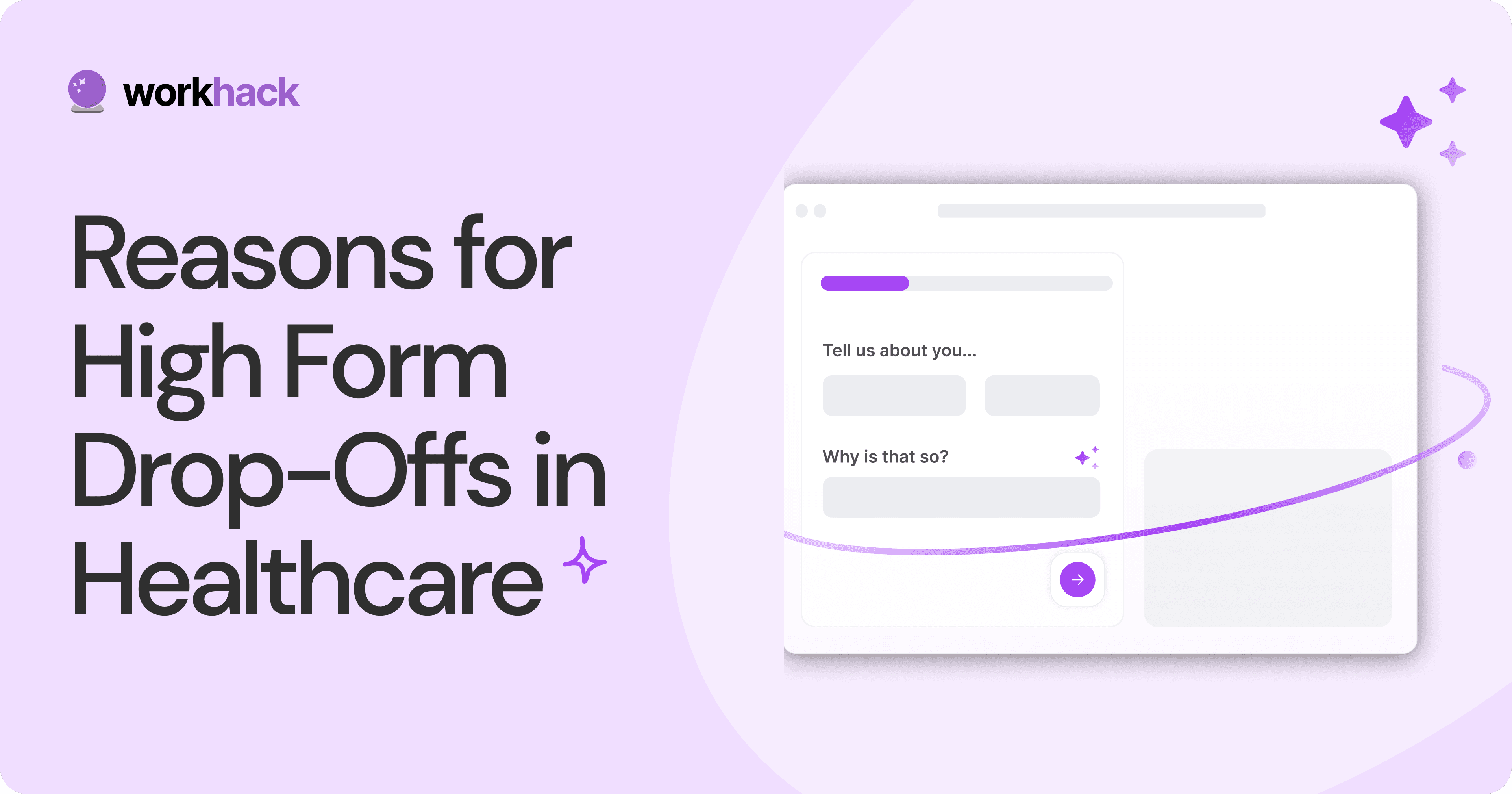
3 Reasons for Major Drop-Offs in Medical Forms.
No matter which healthcare form we pick, there are major drop-off reasons. We shall dive into the top 3 and learn how to resolve them in your next form.
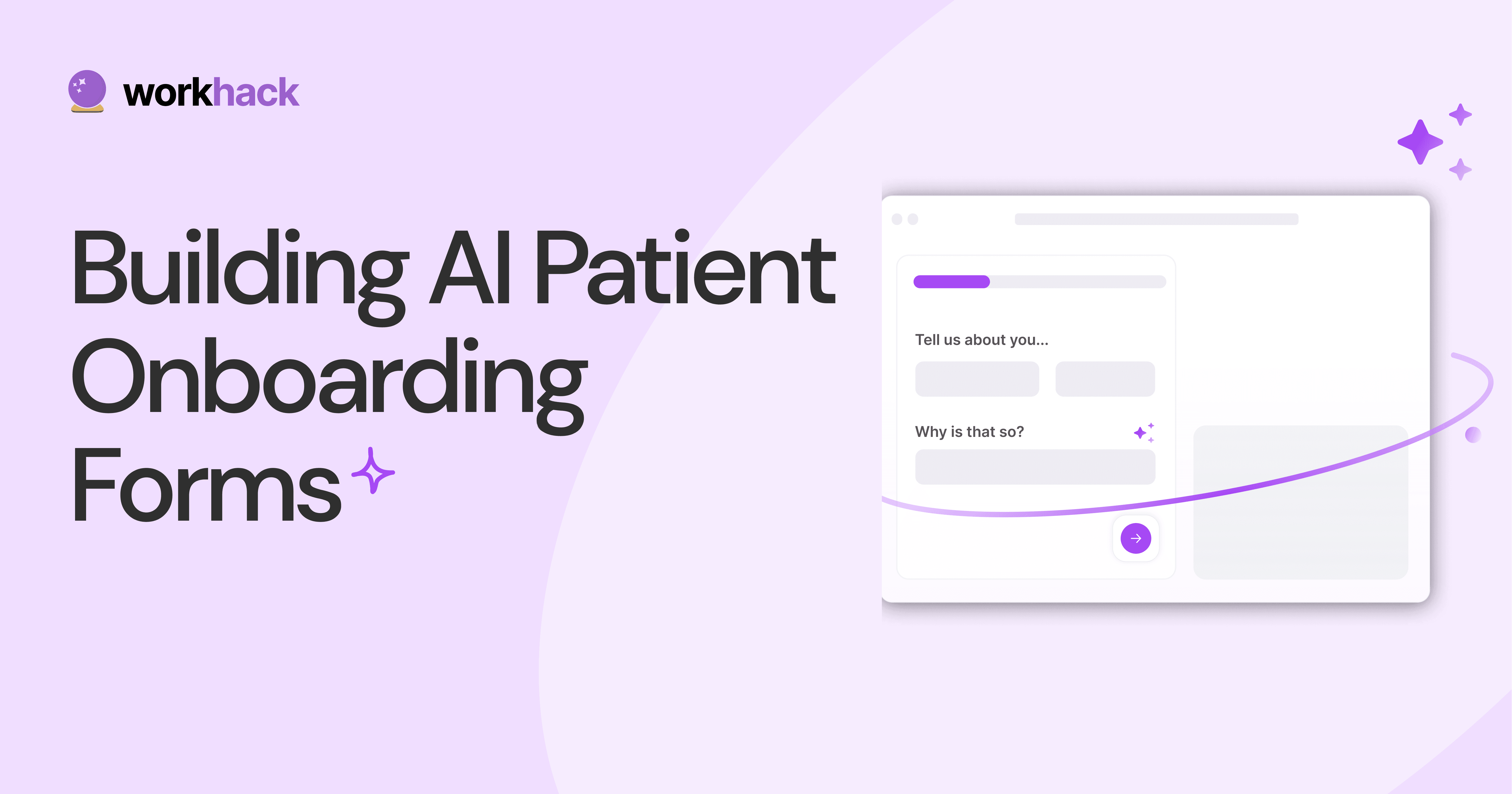
Patient Onboarding Forms - From Click to Clinic.
Patient onboarding forms are the first touchpoint for patients; getting this right for higher conversion rates is a must-have. Learn how to perfect them now.

5 Key Parts of a Good Patient Satisfaction Form.
The goal of patient satisfaction surveys is to course-correct the services of a healthcare provider. Patient feedback leads to a culture of patient-centric care.
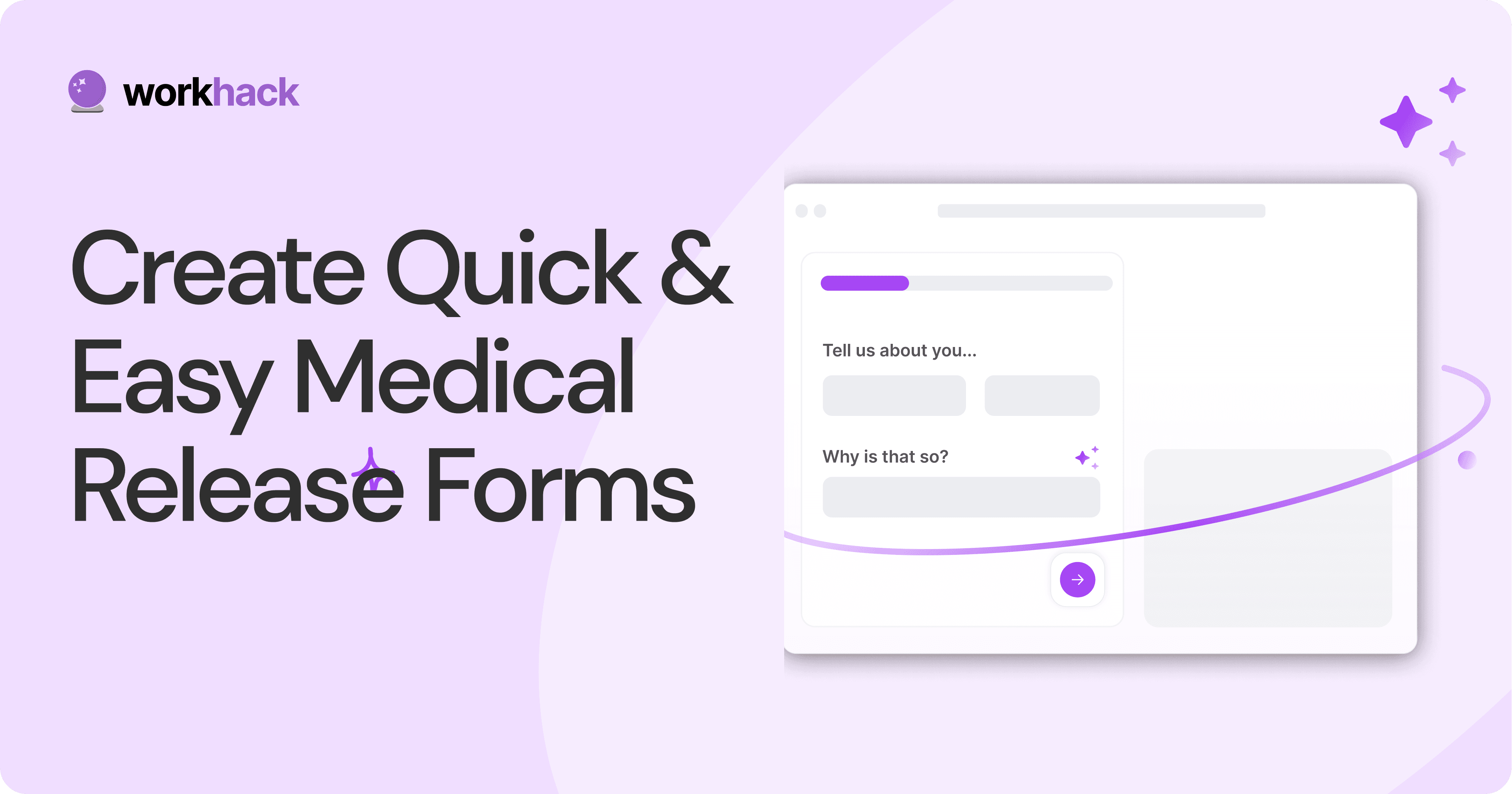
Build Quick and Easy Medical Release Forms.
Every HIPAA-compliant healthcare provider comes across medical release forms that involve details from medical history forms. Can they be shipped fast? Yes.

Nine Types of Healthcare and Medical Forms.
Medical forms are a must-have for any healthcare business or practitioner. Learn about the different kinds of medical and healthcare forms.

4 Tips for Better Medical History Forms.
Medical history forms are central to patient care, onboarding, and medical administration records. Learn how to make them easier to fill.

How to Build Mental Health Intake Forms?
Mental health intake forms are not like patient intake forms. Mental health intake forms deal with far more sensitive data and have specific design methods.

What, Why and How of Telemedicine Forms.
Telemedicine is on the rise and with different form builders out there, which one best suits your needs as a healthcare services provider?

3 Reasons for Major Drop-Offs in Medical Forms.
No matter which healthcare form we pick, there are major drop-off reasons. We shall dive into the top 3 and learn how to resolve them in your next form.

Patient Onboarding Forms - From Click to Clinic.
Patient onboarding forms are the first touchpoint for patients; getting this right for higher conversion rates is a must-have. Learn how to perfect them now.

5 Key Parts of a Good Patient Satisfaction Form.
The goal of patient satisfaction surveys is to course-correct the services of a healthcare provider. Patient feedback leads to a culture of patient-centric care.

Build Quick and Easy Medical Release Forms.
Every HIPAA-compliant healthcare provider comes across medical release forms that involve details from medical history forms. Can they be shipped fast? Yes.

Nine Types of Healthcare and Medical Forms.
Medical forms are a must-have for any healthcare business or practitioner. Learn about the different kinds of medical and healthcare forms.

4 Tips for Better Medical History Forms.
Medical history forms are central to patient care, onboarding, and medical administration records. Learn how to make them easier to fill.

How to Build Mental Health Intake Forms?
Mental health intake forms are not like patient intake forms. Mental health intake forms deal with far more sensitive data and have specific design methods.

What, Why and How of Telemedicine Forms.
Telemedicine is on the rise and with different form builders out there, which one best suits your needs as a healthcare services provider?

3 Reasons for Major Drop-Offs in Medical Forms.
No matter which healthcare form we pick, there are major drop-off reasons. We shall dive into the top 3 and learn how to resolve them in your next form.

Patient Onboarding Forms - From Click to Clinic.
Patient onboarding forms are the first touchpoint for patients; getting this right for higher conversion rates is a must-have. Learn how to perfect them now.

5 Key Parts of a Good Patient Satisfaction Form.
The goal of patient satisfaction surveys is to course-correct the services of a healthcare provider. Patient feedback leads to a culture of patient-centric care.

Build Quick and Easy Medical Release Forms.
Every HIPAA-compliant healthcare provider comes across medical release forms that involve details from medical history forms. Can they be shipped fast? Yes.

Nine Types of Healthcare and Medical Forms.
Medical forms are a must-have for any healthcare business or practitioner. Learn about the different kinds of medical and healthcare forms.

4 Tips for Better Medical History Forms.
Medical history forms are central to patient care, onboarding, and medical administration records. Learn how to make them easier to fill.

How to Build Mental Health Intake Forms?
Mental health intake forms are not like patient intake forms. Mental health intake forms deal with far more sensitive data and have specific design methods.

What, Why and How of Telemedicine Forms.
Telemedicine is on the rise and with different form builders out there, which one best suits your needs as a healthcare services provider?

3 Reasons for Major Drop-Offs in Medical Forms.
No matter which healthcare form we pick, there are major drop-off reasons. We shall dive into the top 3 and learn how to resolve them in your next form.

Patient Onboarding Forms - From Click to Clinic.
Patient onboarding forms are the first touchpoint for patients; getting this right for higher conversion rates is a must-have. Learn how to perfect them now.

5 Key Parts of a Good Patient Satisfaction Form.
The goal of patient satisfaction surveys is to course-correct the services of a healthcare provider. Patient feedback leads to a culture of patient-centric care.

Build Quick and Easy Medical Release Forms.
Every HIPAA-compliant healthcare provider comes across medical release forms that involve details from medical history forms. Can they be shipped fast? Yes.
Subscribe to stay updated.
Subscribe to stay updated.
Subscribe to stay updated.
HC

HC

HC

HC

70+ people from across industries read our emails.
HC

HC

70+ people from across industries read our emails.
HC

HC

HC

70+ people from across industries read our emails.




Bangalore, India / San Francisco, US
WorkHack Inc. 2023
Bangalore, India
San Francisco, US
WorkHack Inc. 2023
WorkHack Inc. 2023
Bangalore, India / San Francisco, US
WorkHack Inc. 2023
Bangalore, India / San Francisco, US



